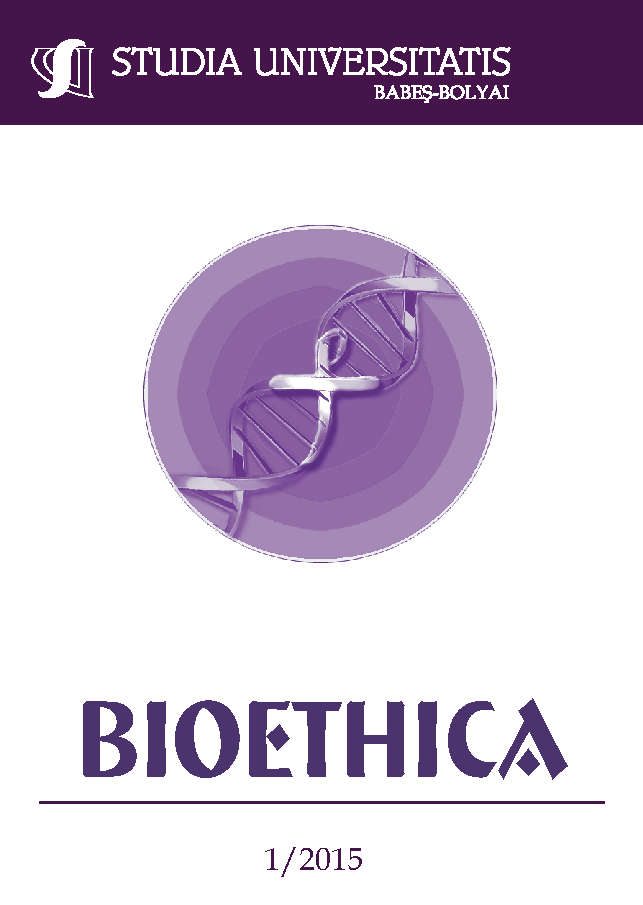A DUTY TO KNOW TO BE AUTONOMOUS? FOCUSING PERSONAL AUTONOMY ON THE RIGHT NOT TO KNOW GENETIC INFORMATION
Keywords:
genetic counseling, right not to know, genetic testing, personal autonomy, genetic ignoranceAbstract
A Duty to Know to Be Autonomous? Focusing Personal Autonomy on the Right not to Know Genetic Information. In the bioethical debate regarding access to genetic information, the challenge to the notion of personal autonomy is evident when attempting to make sense of and to protect a patient’s interest in not knowing. Such a debate takes place in many areas related to the use of genetic information, however the present work focuses on the context of genetic counseling. One of the main theses in this debate suggests first that the right not to know genetic condition does not increase the value of individual autonomy, but rather degrades it and, second, that a desired ignorance of the results of genetic testing is a guilty one. The article is a response to the arguments of Rosamond Rhodes and Rodolfo Vázquez. The thesis proposes an argumentation that follows a double outline. The first includes an argument against those who exercise their right not to know, stating that one cannot make autonomous decisions without knowing all relevant information. The second takes into account the decision of not knowing related to other individuals, concluding that a person who chooses genetic ignorance is irresponsible or even guilty. The purpose of this paper is firstly suggesting some critical considerations regarding the dyad: need of information - autonomy, while secondly proposing an analysis of the theoretical framework that argues that the choice of not knowing the diagnostic results is an incriminating ignorance.
Datoria de a ști să fii autonom? Autonomia personală concentrată pe dreptul de a nu ști despre informația genetică. În cadrul dezbaterii bioetice privind accesul la informații genetice, provocarea noțiunii de autonomie personală este evidentă atunci când se dorește să aibă un sens de și când se dorește a proteja interesul unui pacient în a nu cunoaște. O astfel de dezbatere are loc în multe domenii legate de utilizarea de informații genetice, articolul nostru concentrându-se pe contextul consilierii genetice. Una dintre principalele teze din această dezbatere sugerează, mai întâi, că dreptul de a nu cunoaște despre o anume condiție genetică nu crește valoarea autonomiei individuale, ci mai degrabă o degradează și, în al doilea rând, că o necunoaștere voită a rezultatelor testelor genetice este o vină. Acest articol este un răspuns la argumentele lui Rosamond Rhodes și Rodolfo Vázquez. Teza noastră propune o argumentare care urmează un dublu contur. Primul include un argument împotriva celor care își exercită dreptul lor de a nu cunoaște, afirmând că nu se poate lua o decizie autonomă, fără să avea toate informațiile relevante. Cel de al doilea ia în considerare decizia de a nu cunoaște despre alte persoane, concluzionând că o persoană care alege să nu cunoască informația genetică este iresponsabilă sau chiar vinovată. Scopul lucrării este, în primul rând, de a sugera câteva considerații critice privind diada: nevoie de informație - autonomie, iar în al doilea rând propune o analiză a cadrului teoretic care susține că alegerea de a nu cunoaște rezultatele diagnosticului este o ignoranță incriminatoare.
Cuvinte-cheie: consultanță genetică, dreptul de a nu ști, test genetic, autonomie personală, necunoaștere genetică
Downloads
Published
How to Cite
Issue
Section
License
Copyright (c) 2015 Studia Universitatis Babeș-Bolyai Bioethica

This work is licensed under a Creative Commons Attribution-NonCommercial-NoDerivatives 4.0 International License.






